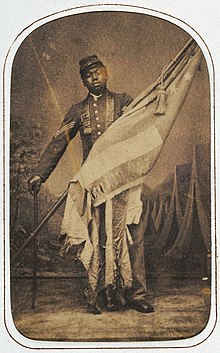William Harvey Carney
| William Harvey Carney | |
|---|---|

Sgt. William H. Carney,
Civil War Medal of Honor recipient |
|
| Born |
February 29, 1840 Norfolk, Virginia |
| Died | December 9, 1908 (aged 68) New Bedford, Massachusetts |
| Place of burial | Oak Grove Cemetery New Bedford, Massachusetts |
| Allegiance |
United States of America Union |
| Service/branch |
United States Army Union Army |
| Years of service | 1863 - 1864 |
| Rank | Sergeant |
| Unit | 54th Massachusetts Volunteer Infantry |
| Battles/wars |
American Civil War Second Battle of Fort Wagner |
| Awards | Medal of Honor |
William Harvey Carney (February 29, 1840 – December 9, 1908) was an African American soldier during the American Civil War. In 1900, he was awarded the Medal of Honor for his gallantry in saving the regimental colors during the Battle of Fort Wagner in 1863. Because his actions preceded those of other medal honorees, he is considered to be the first African American to be granted the Medal of Honor.
William H. Carney was born as a slave in Norfolk, Virginia, on February 29, 1840. How he made his way to freedom is not certain. According to most accounts, he escaped through the Underground Railroad, and joined his father in Massachusetts. Other members of their family were freed by purchase or by the death of their master.
Carney joined the 54th Massachusetts Volunteer Infantry in March 1863 as a Sergeant. He took part in the July 18, 1863, assault on Fort Wagner in Charleston, South Carolina. (The attack on Fort Wagner is depicted in the film Glory.) It was in this attack that Carney's actions ultimately earned him the Medal of Honor. When the color guard was fatally wounded, Carney retrieved the American flag from his comrade and marched forward with it, despite suffering multiple serious wounds. When the Union troops were forced to retreat under fire, Carney struggled back across the battlefield. He eventually made his way back to his own lines and turned over the colors to another survivor of the 54th, modestly saying, "Boys, I only did my duty; the old flag never touched the ground!" Carney received an honorable discharge due to disability (as a result of his wounds) in June 1864.
...
Wikipedia
